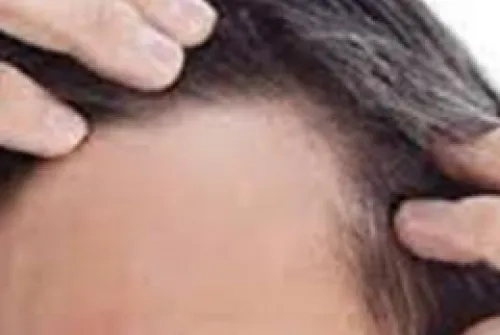Alo Yeditepe
Alo Yeditepe
Intense Stress Makes Hair Ringworm
Head of the Department of Dermatology and Venereal Diseases at Yeditepe University Hospital Prof. Dr. Oktay Taşkapan stated that regional hair loss called "ringworm-alopecia areata" usually occurs after intense stressful events.
Stress, which is the trigger of many diseases today, also causes ringworm. Stating that the most important cause of ringworm is psychosomatic, Taşkapan said that people who experience intense distress, sadness, and stress develop openings in certain areas of their hair.
Prof. Dr. Taşkapan stated that the patient suddenly noticed these focal spills, and sometimes even saw the problem of the hairdresser, not himself. Taşkapan explained that the reason for the increase in ringworm cases was the increase in the number of people who applied to physicians due to this disease, and stated that people used to self-medicate, especially in rural areas.
Garlic is Harmful to Hair Roots
Taşkapan emphasized that people apply garlic to the areas where their hair is shed and said, "Although this is a treatment method, the skin is irritated. This is not a medical method. In the meantime, the skin and hair follicles may be damaged, and hair may not grow in that area again."
Pointing out that ringworm is an autoimmune disease, Taşkapan said, "Human tissue does not normally react to itself, but the tolerance in the ringworm is impaired. The body perceives its own hair follicles as foreign, sends antibodies there and the hairs begin to fall out. Usually there is ejaculation due to the shedding of the scalp, beard, and sometimes eyebrows. Why is it 90% psychological? The disease occurs after very stressful periods, such as distress, tension, trauma, and the loss of a relative. Family history and genetic factors are very effective. When the disease starts at an early age, especially when the back of the head and the upper part of the ears are involved, it becomes more resistant to hair-breaking treatments in the presence of allergic diseases such as asthma and hay fever."
Prof. Dr. Taşkapan pointed out that there is no microbe in the disease and the body reacts on its own, and said:
"Ringworm, although rare, can sometimes be associated with some serious illnesses, such as thyroid disorders, vitiligo, and connective tissue disorders. Therefore, when the patient arrives, we request some screening tests, if necessary, in light of the examination findings. Because the body can react to its own hair follicles to other organs. However, these are very unlikely. Usually, the cause of the disease is psychological, here sometimes it can also be a vicious circle. Psychological factors both trigger the disease and have negative effects on the mental state of the developing alopecia patient. Psychosocial support and psychiatric consultations gain importance in resilient situations."
"Especially in middle-aged people, alopecia is more effective on black hair and white hair is more resistant to loss. When the patient arrives, we perform the examination, if the hair loss is in a limited area, we usually inject cortisone by diluting it at certain rates to the scalp in the first stage, and if necessary, we repeat this treatment once a month according to the clinical response we receive. Or we can go straight with cortisone creams. This is usually good for the patient. After the treatment, first comes the fine hairs we call 'vellus', then they thicken and return to normal hair. In severe and progressive cases, different treatments should be applied. Even if you do nothing, this hair loss will return to normal after a certain period. 30-50% of patients recover spontaneously within one year. But you cannot do anything and wait, because the disease causes anxiety and can lead to significant psychological problems when it spreads."
The Most Common Cause is Iron Deficiency
"The main cause of hair loss in women is iron deficiency" Referring to the general hair loss in women, Taşkapan said that the main cause of hair loss in women is iron deficiency. Taşkapan pointed out that the long and intense menstrual periods and sometimes their nutritional problems cause iron deficiency and hair loss, and said:
"After severe febrile diseases and intense weight loss diets, there is sometimes very rapid hair loss due to thyroid diseases. When a patient arrives with hair loss, the causes need to be investigated first. In addition to iron deficiency, the use of drugs (birth control pills, some blood pressure pills) can cause thyroid diseases, diseases of the internal organs, diseases of the connective tissue, and even syphilis. In short, after all, serious diseases, hair falls out. Stress also has an effect.
Alopecia in Women's Genetic
Emphasizing that some women have "male pattern hair loss-pattern alopecia" and can be seen even at a very early age, Taşkapan said, "In the presence of findings such as an increase in hair loss accompanied by hair loss, prolonged acne, fatty skin and menstrual irregularity in buttock cases, the patient may need to be referred to an endocrinologist. There is no clear cure for male pattern hair loss in women, it's a genetic condition."
Extreme Hot Water and Hard Brushes Should Be Avoided
Emphasizing that many products advertised against hair loss do not work very well, Taşkapan said that there are really successful treatment approaches, especially in common hair loss and hair loss where the cause can be revealed. Prof. Dr. Taşkapan stated that the hair should not be washed with very hot water and should not be brushed with hard brushes and said, "Protect the hair from excessive dyeing and blow-drying." Taşkapan explained that inadequate nutrition can cause hair loss and noted that there is no special diet for hair thickening.
About
Faculty and Year of Graduation:
Medical Faculty of GATA İstanbul, 1986
Alo Yeditepe




